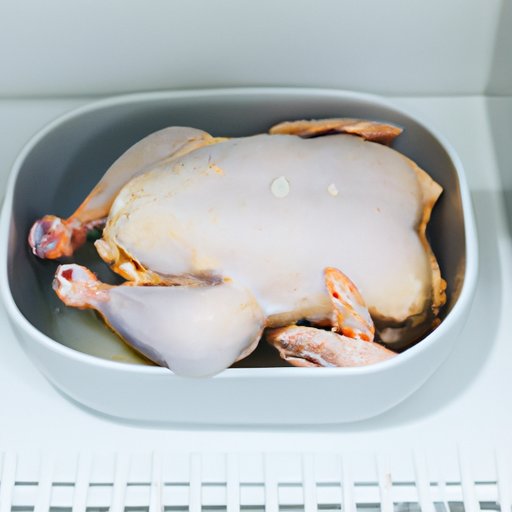
Introduction
Are you one of those people who buys some chicken and then forgets about it until it’s been sitting in the fridge for over a week? You’re not alone. Many people struggle with knowing how long they can safely store raw chicken in the fridge. In this article, we will explore the basics of raw chicken storage, food safety tips, risks of consuming spoiled chicken, and more. By the end of this article, you’ll have all the information you need to safely and effectively store your poultry products.
The Basics: Understanding the Shelf-Life of Raw Chicken
Raw chicken and other poultry products are highly perishable. This means they have a limited storage life before they spoil or become unsafe to eat. The shelf-life of raw chicken depends on a variety of factors such as temperature, packaging, and storage conditions. Understanding this is the first step in safely storing your chicken.
Food Safety Tips: How to Safely Store Raw Chicken in The Refrigerator
To store raw chicken safely in the refrigerator, it is important to use separate containers to prevent cross-contamination with other foods. Proper packaging is also crucial to prevent foodborne illness. The ideal temperature range for storing raw chicken is between 35°F to 40°F. A temperature higher than this can allow bacteria to grow and potentially cause food poisoning.
Risks of Consuming Spoiled Chicken and How to Recognize Them
Eating spoiled chicken can be dangerous and lead to food poisoning. Common symptoms of food poisoning caused by spoiled chicken include nausea, vomiting, diarrhea, and fever. In severe cases, food poisoning can be life-threatening. It is important to recognize the signs of spoiled chicken such as an off odor, slimy texture, and discoloration.
Timeframe for Storing Chicken in the Fridge and Suggestions for Optimal Storage
The recommended storage time for fresh chicken in the refrigerator is 1-2 days for whole chicken and 1-2 days for chicken parts such as breasts, thighs, or wings. However, this timeframe can vary depending on factors such as packaging and temperature. To extend the life of raw chicken, consider marinating it before refrigerating. This can add flavor and help tenderize the meat.
Factors That Affect The Longevity of Raw Chicken in The Refrigerator
Various factors can affect the longevity of raw chicken in the refrigerator. Air circulation, proper sealing of packaging, and the cleanliness of the refrigerator can all impact chicken’s shelf-life. It is important to be aware of these factors to ensure that chicken remains fresh and safe to eat for as long as possible.

Helpful Tips for Preventing and Avoiding Food Waste
In addition to storing chicken safely, it is important to avoid unnecessary food waste. Consider using leftover chicken in recipes such as salads, soups, and stir-fries. Labeling and organizing food in the fridge can also help prevent food from being forgotten and wasted.
Easy Meal Prep Tips: Best Practices for Refrigerating Chicken
Meal prep can be a great way to save time and ensure that there is always food readily available. To extend the life of raw chicken, it is important to avoid overcrowding the fridge and to keep chicken on the bottom shelves. This reduces the risk of cross-contamination and helps maintain a consistent temperature.
Conclusion
In conclusion, storing raw chicken safely and effectively is crucial to prevent food poisoning and reduce food waste. By using separate containers, proper packaging, and storing at the ideal temperature, chicken can stay fresh for an optimal amount of time. Remember to check for signs of spoilage and recognize the risks associated with consuming spoiled chicken. By practicing safe food handling practices and reducing waste, you can enjoy delicious chicken while staying healthy and being environmentally conscious.





